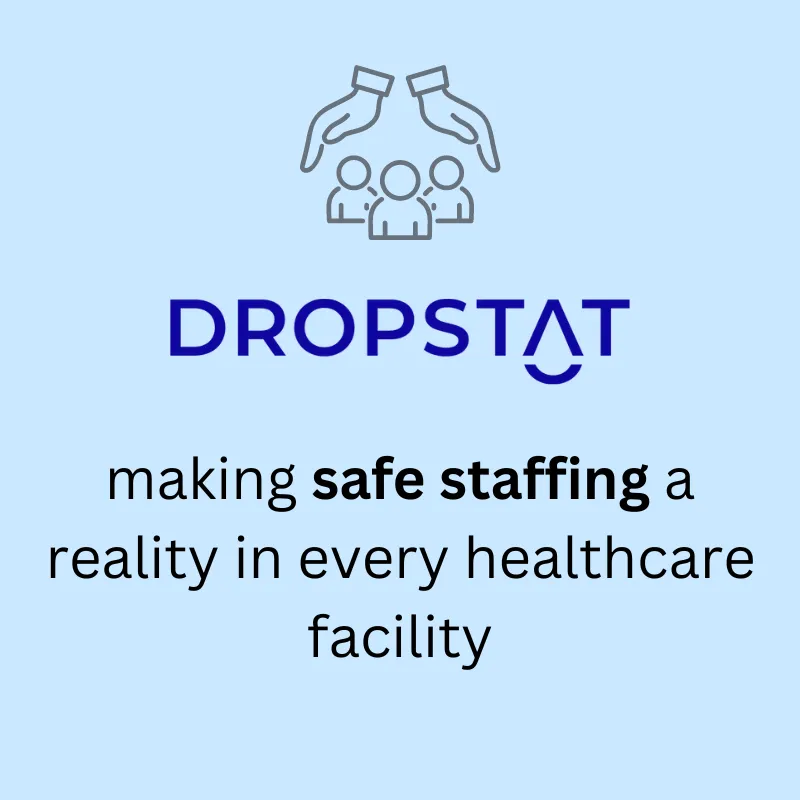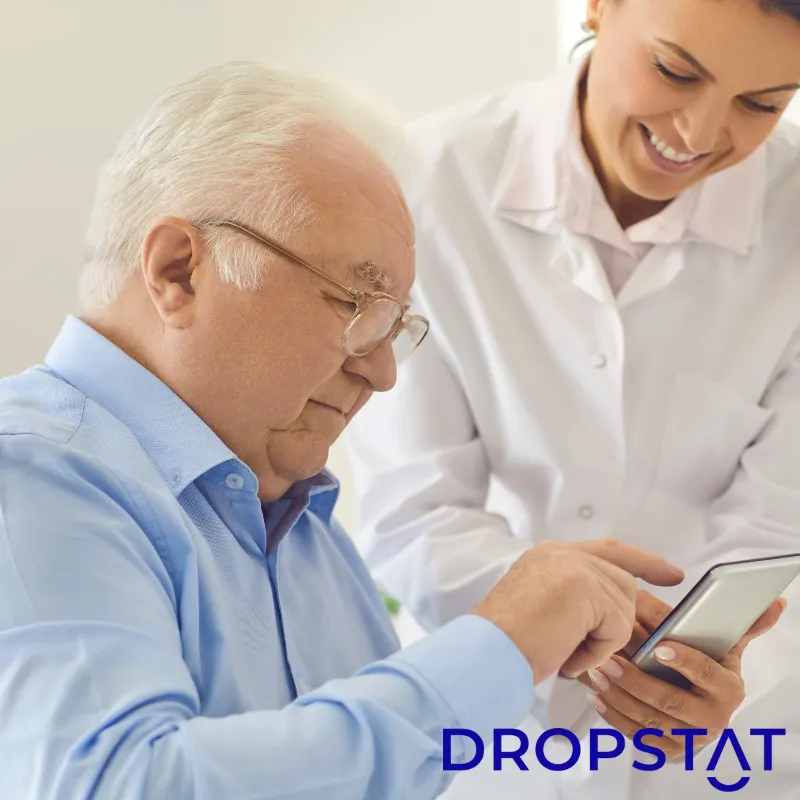13 ways mobile technology in healthcare impacts providers
Mobile technology in healthcare can make healthcare providers’ jobs easier by
1. Streamlining communication with patients
Mobile technology streamlines doctors’ communication with patients by enabling accessibility, secure messaging, appointment reminders, and telehealth visits.
2. Improving access to patient information
Mobile technology improves doctors’ access to patient healthcare information by providing real-time access to all health records, test results, and overall medical history.
3. Efficient appointment scheduling and patient management
Mobile technology can improve efficiency by reducing the number of patients who miss appointments. It enables efficient appointment scheduling and management through online booking, automated reminders, and real-time schedule updates for doctors.
4. Enhancing coordination and collaboration among healthcare teams
Mobile technology fosters coordination and collaboration among healthcare teams by facilitating instant communication, task assignments, and real-time information sharing.
5. Simplifying access to medical guidelines and resources
Mobile technology simplifies access to medical resources, providing healthcare providers with quick and convenient access to up-to-date medical protocols and guidelines.
6. Automating patient follow-ups and treatment plans
Mobile technology automates reminders and notifications for patient follow-ups, ensuring timely communication and improving adherence to treatment plans by using applications that remind patients what the doctor’s instructions are and how to follow the care plan.
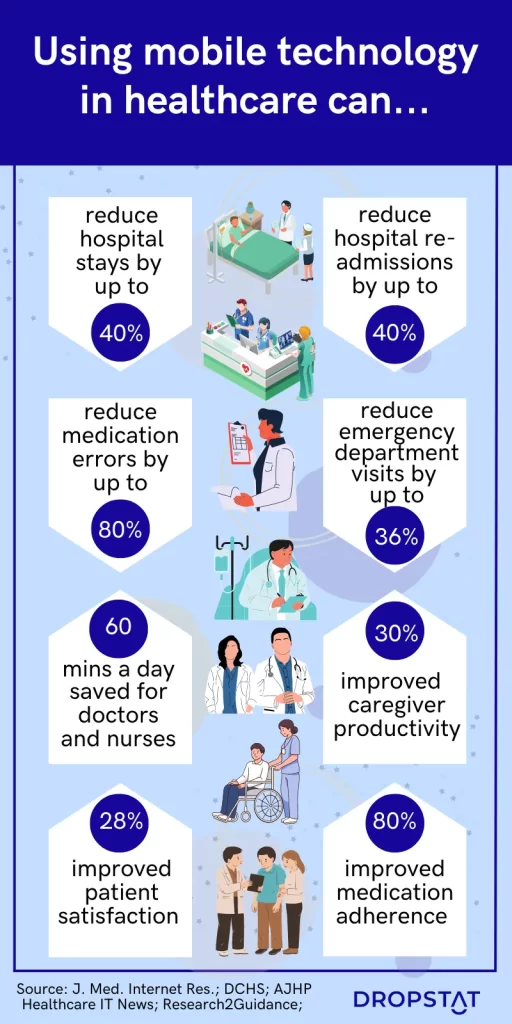
7. Facilitating remote monitoring of patient health status
Mobile technology facilitates remote monitoring of patient health status, allowing doctors to remotely track vital signs and symptoms remotely for timely medical interventions.
8. Seamless integration with electronic health records (EHRs)
Mobile technology enables seamless integration with EHRs, ensuring continuous access to patient data and promoting efficient documentation using customized technology.
9. Speedy and secure exchange of medical data and test results
Mobile technology enables the speedy and secure exchange of medical data and test results, facilitating collaboration and informed decision-making.
10. Making accurate diagnoses with mobile-based decision-support tools
Mobile technology aids in making accurate diagnoses by providing healthcare providers with quick access to clinical guidelines, reference materials, medical databases, and diagnostic resources.
11. Efficient medication management and prescription practice
Mobile technology aids in efficient medication management by clearly showing a patient’s previous and current medication regimen and enables doctors to give online prescriptions efficiently.
12. Remote access to medical imaging and diagnostic reports
Mobile technology enables remote access to medical imaging and diagnostic reports, allowing healthcare providers to review and interpret results anytime, anywhere.
13. Easy record-keeping and note-taking with mobile documentation
Mobile technology simplifies record-keeping and note-taking through mobile documentation, enabling healthcare providers to capture and access patient information for future reference efficiently.
Benefits of mobile healthcare technology for patients
One major benefit of mobile technology for patients is the monetary advantage of reduced healthcare costs through saving time and expense of in-person visits and travel time.
Patients also prefer using mobile technology for health-related activities because it is easier and more efficient.
Mobile technology empowers patients to:
- access healthcare providers
- log in to patient portals
- track steps (walked in a day)
- track glucose levels
- launch a telehealth visit
- manage their medications
- manage medical conditions
- recover at home with remote monitoring
Healthcare decision-makers note that it is the patients who have driven the revolution to use mobile health technology apps and platforms. The impact of mobile technology in healthcare is yet to be seen, but patient push for mobile health technology indicates greater patient engagement. Physicians believe patients will comply more willingly with medical intervention, yielding better patient outcomes.
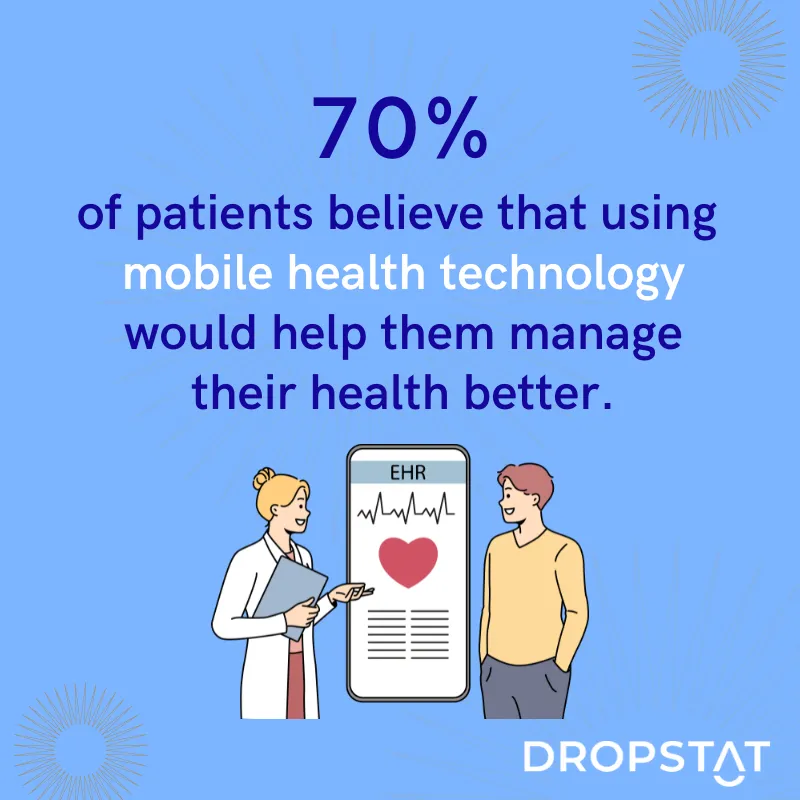
Challenges of using mobile healthcare technology
Mobile technology is still developing. Challenges are part of the development process as Generation Y, Generation Z, and Generation Alpha watch mobile technology revolutionize healthcare.
Some challenges of using mobile technology include:
A diverse array of technologies
There is an explosion of technological devices, and there are myriad new health-related applications as developers race to generate the maximum number of possibilities from available technology. Because of this, medical technology is constantly changing. Having one accepted style or technology protocol would facilitate communication between care providers.
Difficulty choosing which technology to adopt in healthcare facilities
There are so many applications on the market it takes a lot of work for healthcare CEOs to know which technology to adopt. Healthcare managers have to examine the goals of the facility before adopting new mobile technology.
Healthcare decision-makers are responsible for the most efficient use of healthcare capital. Senior healthcare figures must calculate costs and gains when deciding
Which points in the healthcare scene need improving?
Which device or app is proven to be the most useful in achieving that goal?
These are important questions and are connected to strategic planning in healthcare since the technological scene is constantly advancing.
Patient diversity and inclusion
As the use of mobile technology increases, it may be more challenging to reach and motivate all patient groups. Doctors and healthcare managers have to plan for patients who cannot effectively use mobile devices for healthcare due to
- disabilities such as vision impairment reasons
- barriers as a result of advanced age
- financial barriers
- ideological reasons
- cognitive impediments
Poor digital competence among patients and providers
Potentially, some groups of patients could lose out on healthcare opportunities due to poor digital literacy. Staff also may be resistant to change if they are used to providing healthcare services using traditional healthcare methods.
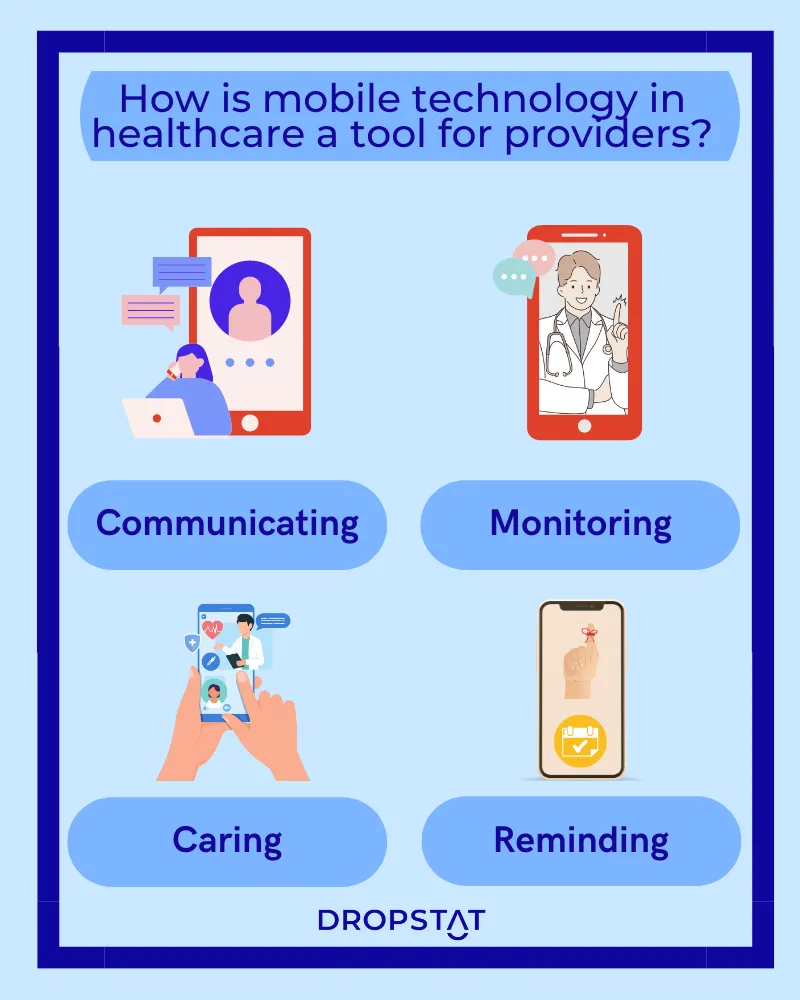
The future of mobile technology in healthcare
The importance of mobile technology in healthcare and technology in nursing is yet to be fully assessed and understood. Healthcare providers believe that mobile technology will bring transformative changes. It may enhance access to care, boost patient engagement, improve efficiency, and foster collaborative care delivery. By leveraging the power of mobile technology, providers aim to deliver patient-centric, efficient, and high-quality healthcare in the digital era.
Around 50% of adults in America will focus this year on improving wellness as a top priority, and other consumers want to focus on their health proactively. The market will be active due to consumers as well as healthcare providers. While the Mayo Clinic has a full policy for mobile health in place, other hospitals report that as little as 2% of patients actually engage with healthcare apps. This indicates that patients may be open to mobile technology trends in healthcare but that they seek apps that are easy to use. Positive coverage of advances in healthcare could motivate more patients to adapt to the changes being brought about by advances in mobile technology.
The WHO’s Global strategy on digital health 2020-2025 is a plan to help people adapt to emerging health technologies, with goals including
- collaboration for a more sustainable digital health system
- action to develop cost-effective health systems and services
- investment into digitalization of parts of the health and wellbeing industries
- empowering people to make healthier choices for overall healthier populations, partly by building digital literacy skills.
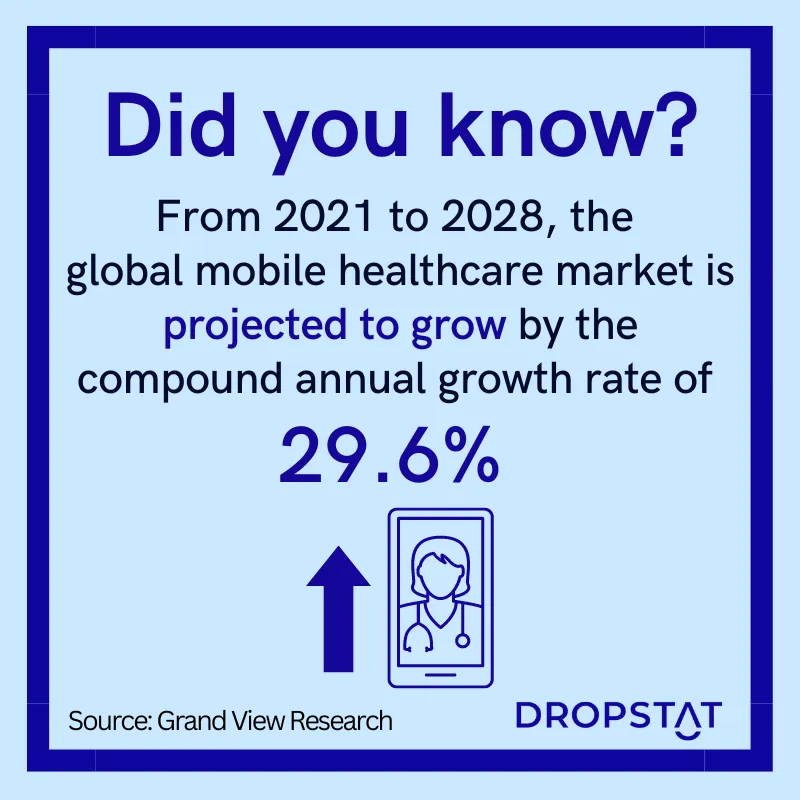
How Dropstat leverages mobile technology in healthcare for efficient and cost-effective shift scheduling
Dropstat is a cutting-edge AI-powered staff scheduling app that uses mobile health technology to make staff scheduling for healthcare facilities more efficient and cost-effective.
Dropstat’s mobile-friendly app improves efficient nurse scheduling.
- Each nurse’s work schedule shows clearly on their phone.
- Staff schedulers see at a glance all unfilled shifts and can send out shift requests to all relevant staff.
- Nurses can pick up open shifts and request open shifts.
- Staff schedulers can approve shifts based on safety and cost metrics to save the facility avoidable overtime.
Cost-effectiveness is built into Dropsat as staff schedulers offer shifts to in-house workers, and premium cost travel or agency nurses are only applied as solutions if no in-house nurses are available.
Schedule a demo with Dropstat to see how scheduling your workforce can become your next step in advancing mobile technology in your healthcare facility.
